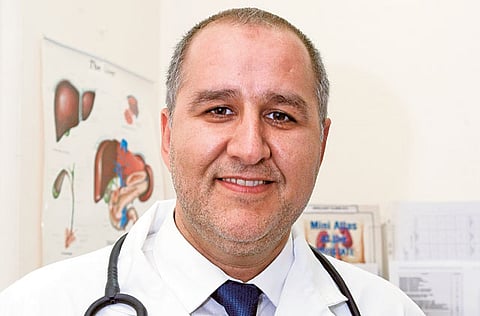Brain-dead patient kidney transplant is UAE first
Woman’s 17-year wait ends as organ is rushed to Abu Dhabi from accident victim in Riyadh

Abu Dhabi: Hooked up to a dialysis machine for 17 years, a young Somali woman has been given a new lease on life after receiving a kidney from a brain-dead person. The first-of-its-kind transplant has spurred calls for new guidelines on post-death organ donations.
Latifa Sai’ed, 23, was wheeled out of Abu Dhabi’s National Transplant Centre (NTC) operating room on April 25 following three-hour surgery. Her donor was declared brain-dead after a car accident in Riyadh earlier that day.
“The kidney worked immediately,” said nephrologist Dr Ammar Abdul Baki, who headed the transplant team. The NTC in Abu Dhabi’s Shaikh Khalifa Medical Centre (SKMC) is the only authorised transplant centre in the country.
Opening the door
“This [operation] will open the door for anybody — for the thousands — who do not have a donor from their family,” said the expert.
The surgery was unexpected and the logistics complex.
Dr Baki recalled: “On Thursday (April 25) afternoon, a hospital in Riyadh alerted us about a possible donor. A 29-year-old man had died of a car accident and his relatives consented to an organ harvest. We swung into action immediately. While some team members contacted customs and airport authorities for clearances, others prepared for the surgery.
“She’s happy and is thinking of going back to school already, though she still cannot understand what’s going on because she has become so hooked up to a machine for more than half of her life and nearly ran out of veins to dialyse from,” said Dr Abdul Baki.
The woman has an extremely good chance of making it: NTC’s record of 97 per cent patient survival rate within the first year is one of best in the world. “If you survive the first year post-transplant, you can live for a very long time,” said Dr Abdul Baki.
Latifa Sai’ed had already undergone more than 20 surgeries making her a poster girl of collaboration between GCC health authorities for organ transplants. The GCC Health Ministers Council approved the Unified Draft Law Regulating Human Organ Transfer and Transplant in GCC states in 2006 — which includes strict rules for organ transplant and controls for verification of death, two years after a committee finalised it in Dubai.
Since January the NTC has performed eight kidney transplants. “We’re hoping to increase the rate to once a week, to about 50 transplants this year.” This is more than double the number in 2011, when 20 transplants were performed. In 2008, when the centre began operations, only four kidney transplants were performed.
After this breakthrough achievement, NTC could soon perform liver transplants too.
Long waiting list
There are 1,600 kidney failure patients in the UAE waiting for transplants, and hundreds more are waiting for other organs like liver, pancreas, bowel and heart.
Organ transplant in the Emirates is governed by a 1993 law (Federal Law No. 15 Regulating the Transfer and Transplant of Human Organs).
The UAE is a bit of a latecomer in this area (the first successful transplant of a human kidney was performed in Boston in 1954) and follows the ‘opt in’ model for organ donations, which is adhered to by most countries.
The UAE organ transplant law was enacted in 1993 (Law No. 15), but it was only in April 2010 when the National Organ Transplant Committee, which includes physicians, legal and Sharia experts, approved implementing rules. A detailed version of implementing rules was completed recently with more safeguards against abuses and has been submitted to the Executive Council.
Organ donation option on Emirates ID
The UAE plans to modify the Emirates ID system, whereby card-holders can opt to indicate their willigness to donate his or her organ in case of death. “The plan is to have it on the Emirates ID, with a box that says ‘I am an organ donor’. In the West, they have it on the driving licence. Here, it’s probably the Emirates ID card,” said Dr Ammar Abdul Baki, a member of the National Transplant Committee.
He said there will still be enough safeguards in place to curb abuses. “Even if your Emirates ID says you are a donor, we still need the family’s consent. That is the model we are adopting, and which we’ve endorsed.”
You Speak
What’s your view on organ donation? Write to us at:
news@xpress4me.com
sms 5101



